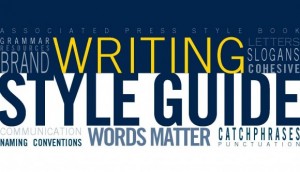I have been thinking a lot recently about writing style and why it is important. With so many writers to choose from, why should people read me? How do I project a voice that is heard over others? I believe a large reason in achieving that is writing style.
Good content remains critical to successful writing, but it is not sufficient in a noisy world. Good writing style enhances content; making it more approachable, understandable and enjoyable for the reader. Why does one blog post, article or story receive 100 reads while one with similar content receives a 100,000? The answer is often writing style.
 I have become very clear with my writing goal is:
I have become very clear with my writing goal is:
“I write to provide enthusiasm and confidence that my reader can learn and accomplish things better from having read my work.”
Everything about my writing style then supports that goal. What works for me can be summarized as follow:
- Respect audience by using less adverbs and adjectives to get point across. Almost every reader can fill in the blanks and achieves greater stickiness to the topic from personal interpretation.
- Use story telling of others to provide insights if need to be critical. Most of my readers have purchased the book because they feel they can improve in this area of life. This means they may feel an inadequacy they want to overcome. Do not tell them they are inadequate! Present them a relevant story of another who has experienced similar.
- (1) Define topic; (2) explain why topic is important; (3) explain how topic works, and (4) provide ways to improve on topic (for example ‘wine appreciation’ in my current WIP Wine Sense, or on personal financial management in published work Still Stupid at Sixty). By defining and explaining, it makes it easier to understand and buy-in to how to improve.
- Be structured, concise and grammatically correct unless it inhibits getting the point across. Bad spelling, grammar and wandering structure inhibit the ability to read and understand. But occasionally a point can be better made is you break a rule intentionally to create emphasis.
- Use more active verbs and style than passive style, encouraging the reader to take action from their reading.
- Achieve credibility and authority through use of examples and third-party references.
- Use appropriate simile to be more expressive and ‘connect the dots’ (“She was as hot as a turd in a horse’s ass” is very expressive, but not very appropriate or enjoyable to read if you want to present her as sexy!)
- Make learning and the reading experience interactive so the reader can steer where they want to go. Use of hyper-links, embedded video links, and QR codes provides the reader the choice to travel where they want. I want my writing to be a guide to help the reader go where they want to next.
These eight principles are the foundation for my style. They work for writing non-fiction which is educational in nature. They would not work as well for other types of writing. You need to understand your audience, what you want to accomplish and then establish your principles. Are you better off being reverent or irreverent or using the occasional swear word or not? Will being politically correct and gender neutral gain or lose readers? Is your writing nice or mean; arrogant or humble; does it matter, and if so, why? Are you the voice to explain things others are unwilling to put to paper? By pondering these questions, you can hone and make clearer the intent of your style.
When I started writing, I just wrote; then I restructured and edited. Now I write with more focused purpose realizing how important style is for success.
© 2013. Steve Shipley, author of Wine Sense, due out early 2014
Twitter: @inkitpub
Twitter: @shipleyaust
Still Stupid at Sixty (published under my writing pseudonym Blake Stevens)
